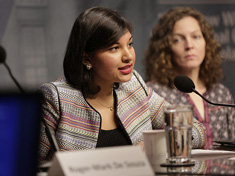-
When Climate Change Exacerbates Conflict, Women Pay the Price, Says Mayesha Alam
May 13, 2016 By Sean Peoples Climate change has the potential to exacerbate conflict and political instability, and women will pay a steeper price than their male counterparts when it does, says Mayesha Alam, associate director of the Georgetown Institute for Women, Peace, and Security, in this week’s podcast.
Climate change has the potential to exacerbate conflict and political instability, and women will pay a steeper price than their male counterparts when it does, says Mayesha Alam, associate director of the Georgetown Institute for Women, Peace, and Security, in this week’s podcast.Climate change has the potential to exacerbate conflict and political instability, and women will pay a steeper price than their male counterparts when it does, says Mayesha Alam, associate director of the Georgetown Institute for Women, Peace, and Security, in this week’s podcast.
Alam, co-author of a report released late last year on women, climate change, development, and security, said “women face specific gender-based vulnerabilities during armed conflict.” These include sexual violence and loss of property when communities disintegrate and resources become scarce.
“As a cross-cutting issue, climate change and environmental degradation intersect with population growth, human mobility, urbanization, and food-water-energy insecurity,” Alam explains. All of these issues have specific gender dimensions and “require tapping the potential and leadership in women and girls to have sustainable and scalable solutions.”
In many communities around the world, “women are already having to adapt their lives to survive and care for their dependents,” she says. Yet, “women are forgotten in terms of climate change adaptation and mitigation initiatives all too often.”
Many community-based women’s groups are responding to environmental challenges on their own. One example is the Sinsibere cooperative, a group of 300 women from a village south of Bamako, Mali. They work to stop local deforestation and develop climate resilience “by providing environmental education and alternative livelihoods for women, setting up micro-credit systems, and providing training in other trades.”
Broader national efforts to address the gender dimensions of climate change have been slower. The International Union for Conservation of Nature has been promoting Climate Change Gender Action Plans as a way to encourage states “to address their climate change and environmental degradation needs but also to address political instability, women’s empowerment, and economic sustainability.” So far, 19 nations have taken up the challenge.
Sources: Georgetown Institute for Women, Peace, and Security, International Union for Conservation of Nature.
Mayesha Alam spoke at the Wilson Center on April 29, 2016.
Friday Podcasts are also available for download on iTunes and Google Podcasts.
 A Publication of the Stimson Center.
A Publication of the Stimson Center.

 Climate change has the potential to exacerbate conflict and political instability, and women will pay a steeper price than their male counterparts when it does, says Mayesha Alam, associate director of the
Climate change has the potential to exacerbate conflict and political instability, and women will pay a steeper price than their male counterparts when it does, says Mayesha Alam, associate director of the 

